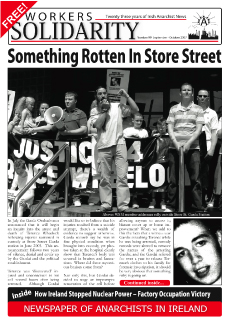Over 30 years of anarchist writing from Ireland listed under hundreds of topics
Why Ireland never got nuclear power
The debate has started. One of the ESB unions, Unite-Amicus, wants the government to build nuclear power stations. We are told that it’s a “clean technology” that will reduce climate change.
What isn’t being given as much publicity is that there is still no way of safe way to dispose of nuclear waste, and that the ultimate ‘weapons of mass destruction’ are a by-product of the nuclear industry. Even more frightening is the reality that just one mistake or accident at a power plant can kill tens, even hundreds of thousands. Near misses like at Three Mile Island in the USA and Mihama in Japan show it can happen, disasters like Chernobyl show us what has already happened.
In the late 1970s a Fianna Fail government was going ahead with plans to build not one, but four, nuclear power stations at Carnsore Point in Co. Wexford. We were promised clean and safe energy that would be so cheap it would be hardly worth metering (in fact it is the most expensive form of electricity generation when waste disposal and decommissioning are taken into account).
Unfortunately for the government and the ESB Board of Directors, not everyone accepted that the plan was some sort of benevolent gift to the Irish people. The main white collar union in the ESB (the ESB Officers Association) produced a detailed report on the health, safety, and civil liberties risks. This was widely circulated both within the ESB and more generally in the trade union movement.
Parallel with this, local anti-nuclear groups sprang up all over the country. Within months a libertarian anti-nuclear magazine called the Contaminated Crow was able to give contact details for 48 groups. Cork had 9 groups, Dublin had 16. And most of these were very active, with their own leaflets, newsletters, pickets of ESB offices.
Big free festivals were held at Carnsore in 1979, 1980 and 1981, which saw around 5,000 camping on the site. Three or four days of discussions, workshops and entertainment from artists as varied as Christy Moore and Chris De Burgh. (yes, it was a very broad movement!).
Throughout all this there was no leader or central committee who the government could negotiate with, flatter or buy off. There was nothing we wanted to bargain about, everyone was agreed that we wanted no nuclear power in Ireland, full stop.
Local groups were completely independent and every three months or so one of them would host a national gathering where anyone could come along, share experiences, throw out ideas, appeal for help, make suggestions, and propose initiatives.
According to every single one of the polls done at the time there was a large majority against going ahead with construction at Carnsore. But the government was determined to press ahead, taking as much notice as they usually do of people's wishes.
A sop thrown out was that they would set up an inquiry to investigate all the pros and cons. The more conservative sections of the movement, gathered around Friends of the Earth agreed to take part. The majority refused, saying they had no confidence in any enquiry set up and financed by the government, and whose findings could be ignored even if the inquiry team somehow bit the hand that fed them and recommended against nuclear power.
When the government saw that almost all anti-nuclear activists were not going to be suckered into passively making submissions and then sitting at home hoping for a good result, the idea of an enquiry was quietly dropped. The anarchists and sections of the left had, instead, called within the unions for blacking the job, and for a mass occupation of the site if construction started. This idea won massive support and led Dessie O'Malley to treat us to a semi-hysterical outburst where he warned that he would use the army if necessary to remove what he called "20,000 hippies".
With major opposition all over the island and several thousand determined to physically stop any building work, the Carnsore plan was quietly dropped. There was no big announcement, But those of us who participated in the anti-nuke movement knew what we had achieved, and so did the state. That's why they have waited 25 years reopen the issue. We beat them once, we can do it again.
From Workers Solidarity 99, September October 2007


